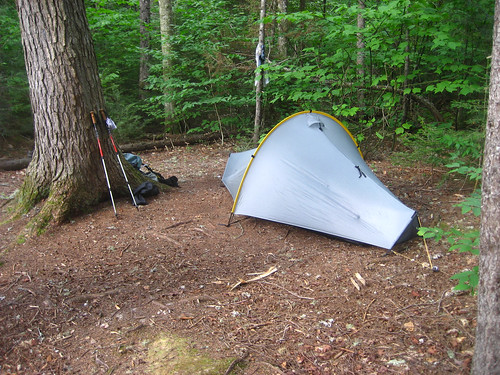
One of the main contributors to backpack weight is your shelter. Two-person tents can weigh six pounds or more. Even a solo tent can be heavy after a long day of backpacking. And that weight seems to be cumulative on an extended hike, getting heavier day after day. If you want to cut pack weight, your shelter is a good place to start.
Carrying less weight on your backpacking trip means you can hike farther in a day with less fatigue. It means you can enjoy the entire trip more. But some lightweight shelters require some sacrifices that may be outside your comfort zone. Your answers to these questions can help you decide which lightweight backpacking shelter is right for you.
When I backpack, am I camping or hiking? People have different approaches to backpacking. Some camp so they can hike; some hike so they can camp. If the camping part is more important to you, you may be willing to carry a little more weight so you're more comfortable in camp. If you're more focused on the hiking, your tent may just be something to keep rain off while you sleep, and the lighter the better.
How much room do I really need? If you are hiking alone, you only need a one-person tent, although many choose a two-man tent for the extra space. If you keep your gear outside overnight, you won't need as much room in the tent, but if you are more comfortable keeping your things close at hand and out of the weather, you'll have to allow space (and weight) for that.
Can I live with insects? Some ultralight backpacking shelters are not fully enclosed. If you don't like the idea of sleeping with creepy-crawlers, you may be willing to carry the weight of a full tent with a zippered door.
Can I live with dampness? Tents with full rain flies are heavier, but they do a good job of keeping rain out. At the other end of the scale, bivy sacks are very light, but they are known to retain condensation.
Do I hike with trekking poles? Freestanding tents are heavier because they include structural poles, while some ultralight backpacking tents can be set up using trekking poles as supports, thus eliminating the weight of tent poles.
Will I spend much time in my tent? You may think you can get by with a small shelter because you plan to spend most of your time outside, but be aware things may not go the way you plan. After the second full day spent in your tent because of rain, you may be wishing you had a shelter you could sit up in.
Where will I be hiking? If you're climbing up and down mountains, a tent with a small footprint may be easier to wedge into the single tiny site you find late in the evening. If you're in a rocky area, it may be impossible to to drive tent stakes in the ground, and you may wish for a freestanding tent. If you're in the desert, you may want a fully-enclosed tent to keep out rattlesnakes and scorpions.
Am I careful with my gear? Quality lightweight backpacking shelters are well-made, but they might use lighter fabrics that aren't as bomb-proof as that in heavier tents. Used with care, they will perform and last for years, but if you know you have a tendency to be rough on your gear, perhaps you would do better with something a bit heavier.
What are my options? Learn about the best choices in lightweight backpacking tents. Balance your needs and comfort zone against the weight of the available shelters. With options like bivy sacks, tarps, and backpacking hammocks, you may find your choice of lightweight tent isn't a tent at all.
N. B. Shepherd has backpacked thousands of miles in the United States and Canada. Read about her Appalachian Trail hike in her Appalachian Trail book, My Own Hike.
What is your favorite Lightweight Shelter? Tell us about it with a comment below! To see my all time favorite that I've used for over a decade check out Ultralight Backpacking Shelter.
More information on Ultralight Backpacking Gear, Tips, and Techniques can be found at Onestep's Ultralight Backpacking Resource “section hiking the Appalachian Trail with a 10 pound pack”.
What is your favorite Lightweight Shelter? Tell us about it with a comment below! To see my all time favorite that I've used for over a decade check out Ultralight Backpacking Shelter.
More information on Ultralight Backpacking Gear, Tips, and Techniques can be found at Onestep's Ultralight Backpacking Resource “section hiking the Appalachian Trail with a 10 pound pack”.

No comments:
Post a Comment